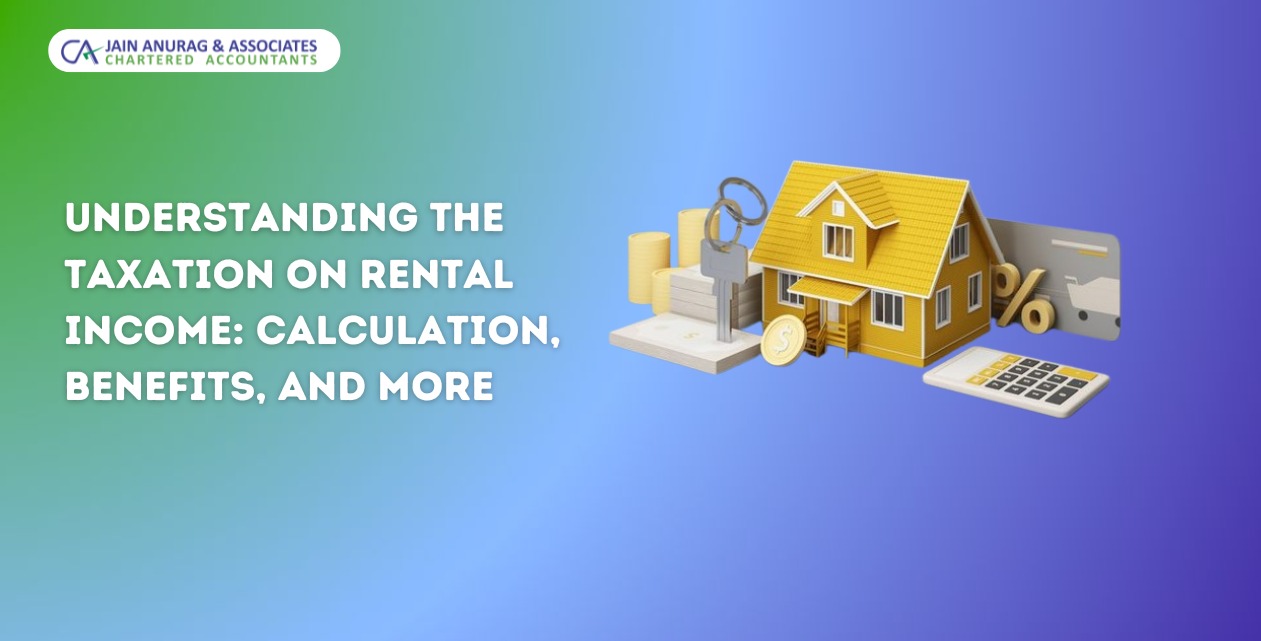Mar 28, 2025, Posted by Admin
Understanding The Taxation on Rental Income: Calculation, Benefits, and More

Rental income is a common source of revenue for property owners. However, understanding how this income is taxed is crucial for effective financial management. In this blog, we'll explore the types of rental income, how taxes are applied, calculation examples, and the potential benefits available.
Types of Rental Income
Rental income typically falls under the following categories:
1. Residential Rental Income: Income from renting out residential properties like apartments, houses, or vacation homes.
2. Commercial Rental Income: Earned from leasing commercial properties such as offices, shops, or warehouses.
3. Subletting Income: If a tenant rents out a part of the property to another tenant, the sublet rent counts as rental income.
Taxation on Rental Income
Rental income is taxable under the head "Income from House Property". The applicable tax depends on factors such as ownership status, property usage, and the deductions claimed.
Calculation of Taxable Rental Income
The formula to calculate taxable rental income is:
Taxable Rental Income = Gross Annual Value (GAV) - Municipal Taxes Paid - Standard Deduction (30%) - Interest on Home Loan (if applicable)
Where:
• Gross Annual Value (GAV) = Higher of actual rent received or expected rent based on market rates
• Municipal Taxes Paid = Property tax paid to the local authority
• Standard Deduction = A fixed 30% deduction on GAV to cover repairs, maintenance, etc.
• Interest on Home Loan = Interest paid on loans taken for property acquisition, construction, or renovation
Tax Calculation Table
| Particulars |
Amount (in ₹) |
| Gross Annual Value (GAV) | 3,00,000 |
| (-) Municipal Taxes Paid | 20,000 |
| Net Annual Value (NAV) | 2,80,000 |
| (-) Standard Deduction (30%) | 84,000 |
| (-) Interest on Home Loan | 50,000 |
| Taxable Rental Income | 1,46,000 |
Benefits and Deductions on Rental Income
1. Standard Deduction: A flat 30% deduction under Section 24(a) for maintenance expenses, irrespective of actual expenditure.
2. Interest on Home Loan: Deduction on interest paid under Section 24(b) up to ₹2 lakh for self-occupied and unlimited for let-out properties.
3. Municipal Tax Deduction: Property tax payments are fully deductible.
4. Tax Savings on Co-ownership: When a property is co-owned, each owner can claim deductions like mortgage interest, property maintenance from the taxable income.
Final Thoughts
Understanding taxation on rental income is essential for better financial planning and minimizing tax liabilities. Property owners should maintain accurate records of income, expenses, and loan interest payments to maximize their deductions. Staying informed and seeking professional guidance can help optimize tax benefits.
At Jain Anurag & Associates, a trusted Chartered Accountant firm in Mumbai, we provide expert tax advisory services to help you manage your rental income efficiently.
For personalized tax planning and consultation, feel free to Contact Us today!